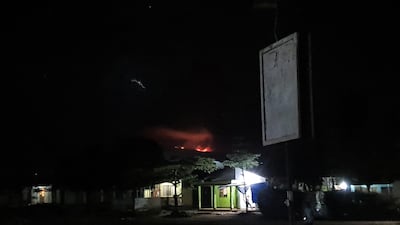As firefighters and volunteers battle for a third day to put out a blaze on Mount Kilimanjaro, tourist activities in the area remain unaffected, say officials.
The world's highest free-standing volcanic mountain caught fire on Sunday afternoon. The blaze started in Whona, a rest spot for climbers traversing Kilimanjaro via its Mandara and Horombo trails, two of several treks up the mountain.
Tanzania National Parks Authority (Tanapa), custodians of the 22 national parks in the country, reassured travellers that tourism can continue.
"Tanapa continues to take all the precautions to ensure that the safety of visitors and their facilities is improved without affecting tourism activities that continue as usual," said the authority in a statement.
Student volunteers from the local College of African Wildlife Management, which hosted the Duke of Cambridge in 2018, have also been assisting in containing the fire.
The trails that tourists and baggage carriers use are the first places that the firefighters secured to ensure the tourists’ safety said Alex Kisingo, a researcher at the university.
One of Africa's favourite tourist destinations, Tanzania reopened to visitors in July. Travellers are being temperature screened on arrival with Covid-19 testing being carried out for anyone with symptoms of the virus, but no other general restrictions are in place. The country has been receiving a steady stream of travellers since July.
Kilimanjaro's 35,000 trekkers per year
Data from Tanapa shows that most tourists arriving in the country since it reopened are from France, with 3,062 French visitors arriving between July and September. This is closely followed by visitors from the United States, Germany, the UK and Spain.

June to October is the most popular time for trekking on Kilimanjaro. In a normal year, upward of 35,000 tourists travel to the region to attempt to summit the 5,895-metre-tall mountain.
Across Tanzania, tourism is a cornerstone of the economy, contributing more than 17 per cent to the country's gross domestic product and employing at least 600,000 people.





